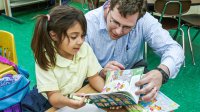Early Literacy Instruction Should Go Beyond the Basics
Preparing kids to be critical thinkers and problem solvers requires teaching a mix of foundational skills and higher-level abstract skills.
Your content has been saved!
Go to My Saved Content.In the early elementary years, educators can sometimes “inadvertently curb a student’s enthusiasm for learning by focusing too much on grades and scores and the ‘right’ answers,” writes Fang Gao, a lecturer in the English department at Shenyang Pharmaceutical University in Shenyang, China, for ASCD’s Educational Leadership.
To inspire young children to become creative thinkers, problem solvers, and lifelong learners, teachers should lay a strong foundation in early literacy skills like vocabulary and spelling, as well as nurture a set of intangible skills like the ability to make sense of and critically analyze new information.
“The early years of learning (K-3) are an exciting time of rapid growth and cognitive and emotional development, and of building a solid foundation for independence, self-confidence, and self-reliance,” writes Gao.
Striking a Balance
In the early elementary grades in particular, Gao says teachers tend to focus too much of their instructional time on teaching students “constrained skills” like “alphabetic knowledge, phonics, and vocabulary rules,” and then executing these skills in isolation and within time limits.
While the constrained skills are necessary for students to learn to read, Gao points to research indicating that these skills alone won’t make them strong readers or “prepare students for future success with unconstrained capabilities like cognitive flexibility, critical analysis, and contextual variation.”
Striking the right balance in early literacy lessons, therefore, involves teaching a mix of essential foundational skills like sentence mechanics, for example, along with helping students develop the abstract skills they need to “engage in and concentrate on deeper learning, take on challenges, and develop effective communicative and critical thinking capabilities,” Gao writes.
Nurturing a Broader Set of Literacy Skills
Simultaneously cultivating three types of literacy skills—recognition literacy, action literacy, and reflection literacy—in students is especially important, says Gao, because it fosters their creativity and language development, while encouraging them to “see themselves in the text.”
Recognition literacy exercises can include grammar or spelling lessons that help students with their “verbal and visual recognition” through explicit instruction and demonstration, for example.
Action literacy activities, on the other hand, help students develop their “communication and construction of existing established knowledge” by explaining and describing concepts and ideas. As one exercise, a teacher could have students narrate “a story in their own words, linking language usage in certain specific contexts.”
Reflection literacy, the third type, focuses on building students’ ability to question standards and norms and create their own content, like a story or journal entry. When students “analyze their values and understandings of things in their immediate surroundings,” they learn to question “socially constructed meanings and conventions” while building a deeper, more holistic understanding of the world around them, writes Gao.
For an activity that reinforces reflection literacy skills, ask students to be “language detectives” and write down 10 words they frequently hear in different environments in their lives—at home, out shopping, or at school. “By listening to what people around them say, students will learn to look for particular word patterns and actively reflect on the connection between written and oral language,” Gao writes.
These three types of literacy education, Gao emphasizes, can be taught simultaneously, but reflection literacy skills should be developed as early as possible because they instill in children the ability to apply previous knowledge to produce something new, allowing students to become creators, rather than just consumers of knowledge.
“The ultimate goal of education is to prepare students to be independent and resourceful, to take action when parents or teachers are not around to intervene or offer help, and to find ways to handle issues or problems that they encounter in daily life,” Gao writes.
